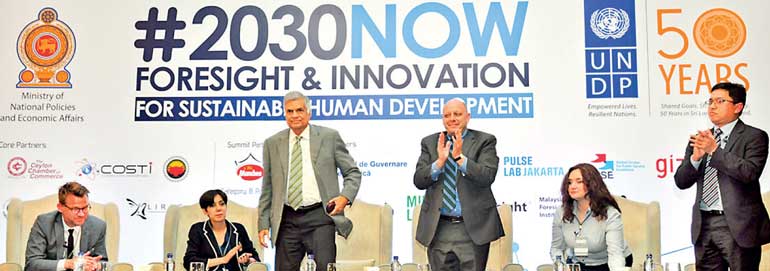Sunday Feb 15, 2026
Sunday Feb 15, 2026
Wednesday, 25 May 2016 00:16 - - {{hitsCtrl.values.hits}}
 Early applause? Prime Minister Ranil Wickremesinghe who revealed plans to unveil the Government's four year sustainable development plan at the opening day of the two-day Sri Lanka Foresight and Innovation National Summit being applauded by UNDP Sri Lanka Resident Representative Peter Batchelor and keynote speaker Malaysia's Foresight Institute Director Rushdi Abdul Rahim. Others from left Denmark MindLab Director Thomas Prehn, UNDP Armenia, Kolba Lab Lead Marina Mkhitaryan and Moldova, eGov Center Performance and Social Innovation Lead, Cornelia Amihalachioae- Pic by Lasantha Kumara
Early applause? Prime Minister Ranil Wickremesinghe who revealed plans to unveil the Government's four year sustainable development plan at the opening day of the two-day Sri Lanka Foresight and Innovation National Summit being applauded by UNDP Sri Lanka Resident Representative Peter Batchelor and keynote speaker Malaysia's Foresight Institute Director Rushdi Abdul Rahim. Others from left Denmark MindLab Director Thomas Prehn, UNDP Armenia, Kolba Lab Lead Marina Mkhitaryan and Moldova, eGov Center Performance and Social Innovation Lead, Cornelia Amihalachioae- Pic by Lasantha Kumara
By Dharisha Bastians
The Government will unveil its four year development plan in two weeks, focused on rapid sustainable development to improve the country’s living standards and harness Sri Lanka’s strategic location and human resources, Prime Minister Ranil Wickremesinghe said yesterday.
Prime Minister Wickremesinghe, who participated in a Panel Discussion at #2030NOW, the National Summit on Foresight and Innovation for Sustainable Human Development last evening, said the Government was also looking to set up a Sustainable Development Council, a proposal that would be put to Cabinet and eventually to Parliament. The Premier said that Sri Lanka must join the global value chain, and the country’s economy must change and become more competitive. “We are living in an age profits alone, competition alone is not sufficient. Have to ensure people have good living standards to avoid popular revolts due to economic inequality,” Wickremesinghe explained.
He said a lot of countries had sacrificed the environment, their values and democracy for the sake of economic development. The Government was hoping to ensure development initiatives remained sustainable, Wickremesinghe added.
The Premier who addressed the session on “Reimagining Governance: An Opportunity for Sri Lanka,” posed important questions: “Can a Government have a dream? Can a Government have a vision? Just after 1947, Sri Lanka was leading Asia in economic and social development. What happened to us, that others overtook us? What happened to us, that we got left behind?”
The people of Sri Lanka want to catch up on lost opportunities, Premier Wickremesinghe noted.
“This is a challenging task, and in a democracy, to meet challenges you need consensus and a challenging team. This is why we have opted for a National Government – what we could not achieve as two separate political parties, perhaps we can achieve together,” Wickremesinghe hoped.
Outlining the two fold strategy for economic prosperity and innovation, Prime Minister Wickremesinghe said the Government was focused firstly on reconciliation and strengthening democracy. “Without reconciliation, the end of the war will never bring peace. We will never be one nation. Without strengthening democracy there will be no free flow of ideas that could lead to innovation,” he explained.
Wickremesinghe also highlighted the need to strengthen economic cooperation across the globe through free trade agreements and economic partnerships.
Since time immemorial Sri Lanka has traded with the world, but to trade with the world today the country requires an edge in a competitive market system, he explained.
“First we need to move in and ensure we have a sufficient number of FTAs which will enable you to deal with a large number of countries. We need to focus on economic and trade cooperation from Europe to Japan, including India, China, Malaysia, Indonesia, Thailand and Korea. Where all this leads for us is an agreement with the United States – of course this will be decided only after November 2016,” the Prime Minister said, referring to the US Presidential election.
Sri Lanka needed to focus on its greatest capital – human resources – and build on this resource and skills. “A policy for human development, combined with our strategic position, can lead to innovation,” the Premier told summit participants at Water’s Edge, Battaramulla at the closing session.
Wickremesinghe said part of the Government’s plan to make Sri Lanka competitive included its ambitious plans to turn the Western Province into a mega city.
“We will make it a large, livable city in the Indian Ocean. There are many issues left to be resolved, as last week’s flooding showed us – much of the disaster was man made,” he said.
The Prime Minister said the Megapolis must not only be the largest city in the Indian Ocean, but it must also rank high in sustainable development. “It must be a livable city. In South Asia now many cities are no longer livable,” Wickremesinghe explained.
As Sri Lanka puts plans in place for innovation and technology to boost economic growth, Prime Minister Wickremesinghe emphasised that it was important not to forget the countryside, and the Government would strive to modernise the rural economy.
In the war-battered Northern Province, it was not only the economic fabric that had been destroyed, but also the social fabric that tied communities together, the Prime Minister said.
“In the north now, a village is a group of houses built in one place. We have to find a way to restore the social fabric and build community in these regions. The culture in the north is strong enough to rebuild,” he asserted.
The session attended by Prime Minister Wickremesinghe was moderated by UNDP Resident Representative, Peter Batchelor and included Vice President, myForesight Institute, of the Government of Malaysia, Director of Mindlab, Government of Denmark, Thomas Prehn, Performance and Social Innovation Lead – eGov Center, Government of Moldova, Cornelia Amihalachioae and Lead, Kolba Lab, UNDP Armenia, Marina Mkhitaryan.